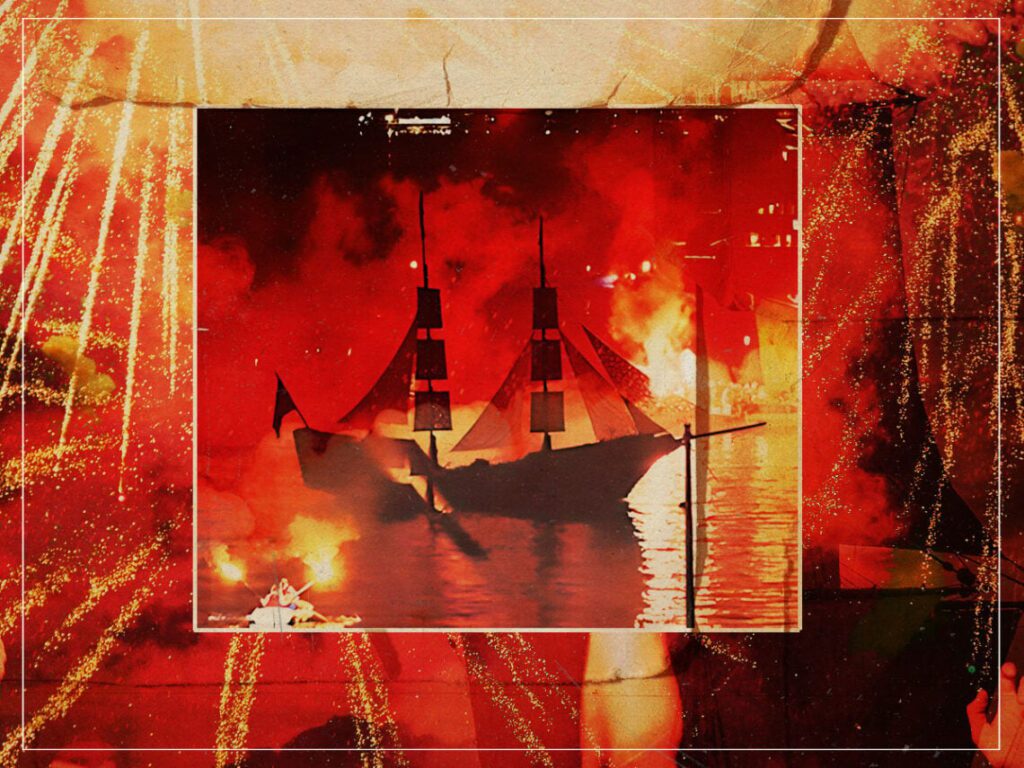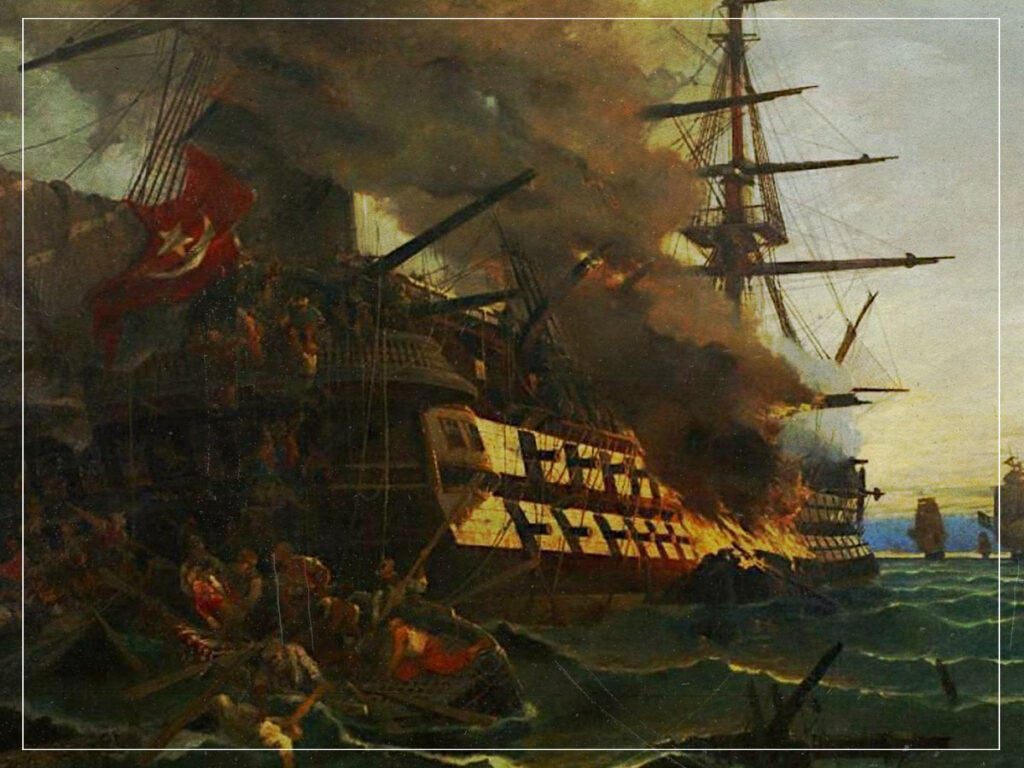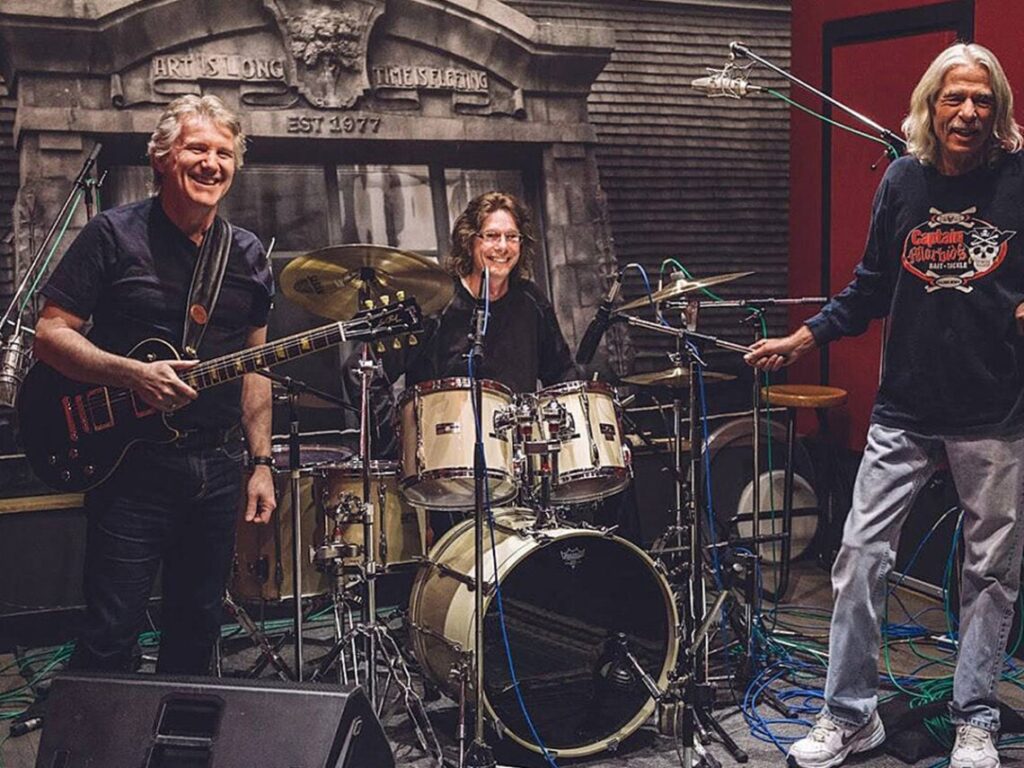Burning Ships at Twilight: The incendiary Armáta celebrations in Spetses, Greece
 Posted On
Posted On
(Credits: Far Out / YouInGreece / Raimond Klavins)
A cruise ship circling the region between Hydra and Spetses in the second week of September might experience hysteria of titanic proportions, with passengers begging the captain to turn the ship immediately. These unwitting pensioners may shriek with alarm, hands pointing towards a burning ship on the horizon. Thankfully, concerns would soon subside to the captain’s insistence that the scene ahead was just a reenactment of naval warfare rather than a modern-day pirate ship battle.
Anyone who has visited some of the smaller Greek islands less eroded by the tides of tourism will understand that the locals are extremely proud of their cultural history. Spetses, an island municipality also including the smaller islands of Spetsopoula, Falkonera, and Velopoula, is a quiet corner of the Attica region, known for its beautiful beaches, seafood restaurants and an abundance of roaming cats.
For one week each year, this region whirs into action for the Armáta Festival. Greek nationals from across the 6,000 islands and the mainland flock to Spetses to celebrate the island’s important role in Greece’s history. As ‘No Vacancy’ signs illuminate the cobbles and restaurants heave, visitors and locals enjoy a week of live music, sunbathing, shopping and indulgence, culminating in a spectacular finale on Saturday evening.
Perhaps less unwitting than our imaginary cruise passengers, yours truly once stumbled upon the biggest event on the Spetses calendar while on holiday in the Greek islands. After a brief spell of cultural immersion, beer absorption and feta-engulfing in the mainland capital of Athens, I ventured into the Aegean with my other half, seeking a relaxing fortnight in Spetses.
As our ferry approached its first stop at Leonard Cohen’s former haunt, Hydra, some fellow tourists asked us where we were heading and for how long. “Spetses? Two weeks?” one exclaimed. They proceeded to inform us that two weeks was far too long to stay in a place as small as Spetses. In response, I told them they had no idea just how capable we were of sitting on a beach and doing nothing.
Unlike your average backpacker, we sought cultural immersion by unpacking our bags into the cupboards and living like the locals. We planned to hire a moped and circle the island’s one main road in search of small, untouched beaches. In the evenings we would return to our apartment and sink a beer with the sun before heading out to sample the local delicacies.
After silencing the negative nellies, we finally alighted at the main port of Spetses on the populous eastern side of the island. Apart from a couple of distribution vans, Spetses is a car-free environment. Therefore, we had to pile our suitcases precariously on the back of a poor local’s motorbike to reach our accommodation. During transit, which took two journeys from the port, the kind taxi rider excitedly informed us of Armáta.

(Credi…
As far as he was concerned, the fact that we happened to arrive on the first day of the festival was nothing short of a miracle. We had booked our accommodation far in advance, and he suggested that some locals would gnaw their arms off to get a nice room for this particular week. Not only was it Armáta, but it was the 200th-year anniversary special.
That evening, we learned more about the festival thanks to the enthusiastic throng of visitors that dwarfed the island’s perennial population. From what we could gather, the main event, taking place on Saturday, would feature a life-size ship as the centrepiece of a unique fireworks display. This year, 2022, would be bigger and brighter than any other as we celebrated the anniversary of the Battle of Nauplia, which occurred on September 8th, 1822.
The battle was part of a wider conflict known as the Greek War of Independence. The war began in 1821 and saw Greek revolutionaries fight back against the Ottoman Empire, which had ruled over the country for nearly 400 years. Severely outnumbered by the Ottoman forces, the revolutionaries, who sought to protect the islands of Spetses, Hydra, and Psara, used their knowledge of local waters and fireships (empty vessels loaded with explosives) to overwhelm the Ottoman fleet.
One of the fireships set an Ottoman flagship ablaze, leading to severe losses. Demoralised after suffering unprecedented amounts of casualties, the Ottomans retreated in what became a pivotal moment in the wider conflict. The Greeks wouldn’t celebrate independence for another seven years, but this crucial battle boosted morale and prevented Ottoman domination of the Aegean Sea.
Having gleaned the fundamental information about Armáta over a couple of Greek salads and ouzos, we awaited the middle weekend of our holiday with anticipation and excitement. In the days before the main event, we managed to steal away to more secluded beaches on a hired moped to read our books in peace, but we were always thankful to return to a bustling town centre that grew more vibrant and energetic with each passing night.
After an evening of live music on Friday, headlined by Greek composer Giorgos Theofanous, the crowds receded to their beds once more before descending to the beaches and bars for the main event. Loudspeakers set up across the town (supposedly) retold the story of Armáta and the Battle of Nauplia in Greek over some triumphant classical music not dissimilar to the Pirates of the Caribbean theme.
We awaited twilight from the comfort of a restaurant terrace, weighed by local seafood but lifted by the electric atmosphere. As darkness stilled the water, small fishing boats began to circle close to a large ship in the centre. On one small boat, a flame was just about visible from the shore. As it approached the ship, a lithe silhouette below thrust it on board. A short delay intensified by silence in the streets gave way to the thunderous brawl of fireworks ascending from the ship.
The pyrotechnics were elaborate and prolonged, attesting to a hefty cache of explosives on board this Ottoman-style ship. Within a few seconds, the vessel began to roar with flames. As the inferno spread, it engulfed the entire upper deck and licked at the three masts. The crowds stood in awe, awaiting the first of the masts to fall. The sturdy beams outlasted the firework display, which cascaded across the main pier.
As the last explosions rang out, waiting staff returned from the streets to their duties, and chatter resumed among the punters. Similar to Guy Fawkes’s night in the UK, the bonfire endured into the evening, yet this bonfire resulted from a substantial investment and the attentive labour of shipbuilders. The meandering crowds murmured and pivoted as each mast succumbed to gravity. When the last gave way to a diminishing flame, the seafront emptied into the town centre, where drinks and tales of years past flowed deep into the night.
[embedded content]


